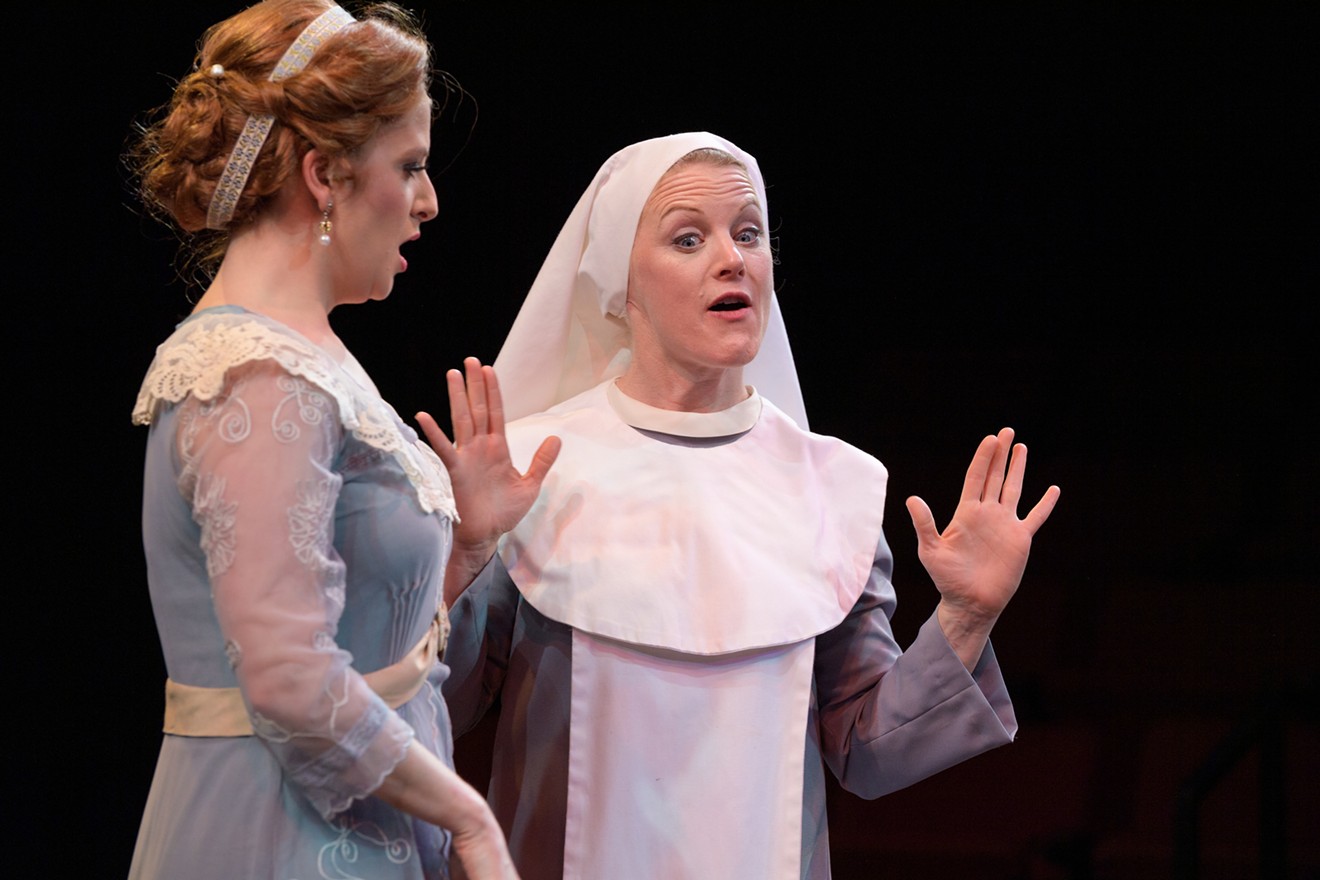Those of us who have seen Jessica Austgen on stage know her as elegant, zany, gutsy and very, very funny. And we expect much the same from her original play, Sin Street Social Club, adapted for the Arvada Center — where it’s receiving its worldwide premiere — from Aphra Behn’s The Rover. Written in 1677, The Rover was the first produced play by a woman playwright, and the center’s Black Box Repertory Company’s current season is entirely the work of female playwrights. In addition to Austgen’s piece, the lineup includes The Diary of Anne Frank, in an adaptation by Wendy Kesselman (the original opened in the 1950s and was written by Frances Goodrich and Albert Hackett), and Jen Silverman’s weird, wonderful and contemporary The Moors.
Sin Street Social Club won’t disappoint Austgen fans. It’s elegantly staged, with stunning costumes by Clare Henkel and a set creatively put together by Brian Mallgrave to serve as the location for all three productions. The dialogue is witty, inventive and often hilarious; the action, thanks to director Lynne Collins and fight director Geoffrey Kent, is fast and furious; and the acting is as daring, full-out and utterly ridiculous as we would expect if Austgen herself were performing.
Set in New Orleans during the 1916 Mardi Gras, Sin Street Social Club centers on the story of two half-sisters. Florie Mae sings in her family-owned social club — the only building on her block not devoted to prostitution. The witty and defiant Helen is about to become a nun — not because she has a calling, but because the sisters’ home will be sold and lost to the general debauchery of the street unless both of them are well settled by a certain date according to their father’s will. And that’s something their violent brother Pete won’t let happen: Pete intends to see that Florie Mae — who’s fallen in love with Belville, a man she met on a streetcar — marries wealthy, stable Tony.
Things are complicated by the arrival of Wilmore, a randy but charming sailor, and the goings-on at Annie B’s expensive brothel. Then there are Lu and Blunt, whose roles in the plotline are unclear, except that slinky Lu is intent on swindling Blunt, who is carrying everyone else's money, for some vague reason.
It’s not an ideal plot, messy and a bit too long, and I’m guessing I'm not the only one who sometimes lost the thread. No single character was sympathetic enough for you to care about his or her fate. But then, Aphra Behn’s plot wasn’t ideal, either. You do catch some Elizabethan-Restoration influences in Sin Street: At one point Helen disguises herself as a man, just as some of Shakespeare’s most intriguing heroines did, though her reasons aren’t as urgent. Even in farce, which this primarily is, we tend to want coherence, if only lunatic coherence.
Still, Sin Street remains enjoyable, because it’s filled with spirited and hilarious scenes. Emily Van Fleet and Jessica Robblee are perfectly cast as frequently fuddled but determined Florie Mae and cheeky Helen. Zachary Andrews gives a terrific performance as Pete — so dangerously volatile and at the same time so utterly dopey. Regina Fernandez plays sneaky, flirty Lu and Larry Cahn is steady Tony, while Lance Rasmussen shows a gift for physical comedy as Belville. Geoffrey Kent and Emma Messenger cook up one of the funniest and most inventive flirtation scenes imaginable playing Wilmore and Angie B, and Kent brings actual feeling and humanity to his role later in the play.
I had a problem with the casting of Blunt, though. Abner Genece is a fine actor, but his Blunt is the kind of slack-jawed booby who evokes every ugly Hollywood stereotype that black actors were once forced to portray if they wanted work. Most distressing is a sort of rape scene he's in, even though it ends in an innocent tickle-giggle contest. Surely Collins, who cares enough about human rights to honor women writers this season, could have considered the implications of this casting. It's a disappointing turn after the Arvada Center was just named Best Place to See Talented Actors...Again and Again, in the Best of Denver 2019.
Sin Street Social Club, presented by the Arvada Center’s Black Box Repertory Theatre through May 19, 6901 Wadsworth Boulevard, Arvada, 720-898-7200, arvadacenter.org.
[
{
"name": "Air - MediumRectangle - Inline Content - Mobile Display Size",
"component": "12017618",
"insertPoint": "2",
"requiredCountToDisplay": "2"
},{
"name": "Editor Picks",
"component": "17242653",
"insertPoint": "4",
"requiredCountToDisplay": "1"
},{
"name": "Inline Links",
"component": "18838239",
"insertPoint": "8th",
"startingPoint": 8,
"requiredCountToDisplay": "7",
"maxInsertions": 25
},{
"name": "Air - MediumRectangle - Combo - Inline Content",
"component": "17261320",
"insertPoint": "8th",
"startingPoint": 8,
"requiredCountToDisplay": "7",
"maxInsertions": 25
},{
"name": "Inline Links",
"component": "18838239",
"insertPoint": "8th",
"startingPoint": 12,
"requiredCountToDisplay": "11",
"maxInsertions": 25
},{
"name": "Air - Leaderboard Tower - Combo - Inline Content",
"component": "17261321",
"insertPoint": "8th",
"startingPoint": 12,
"requiredCountToDisplay": "11",
"maxInsertions": 25
}
]












